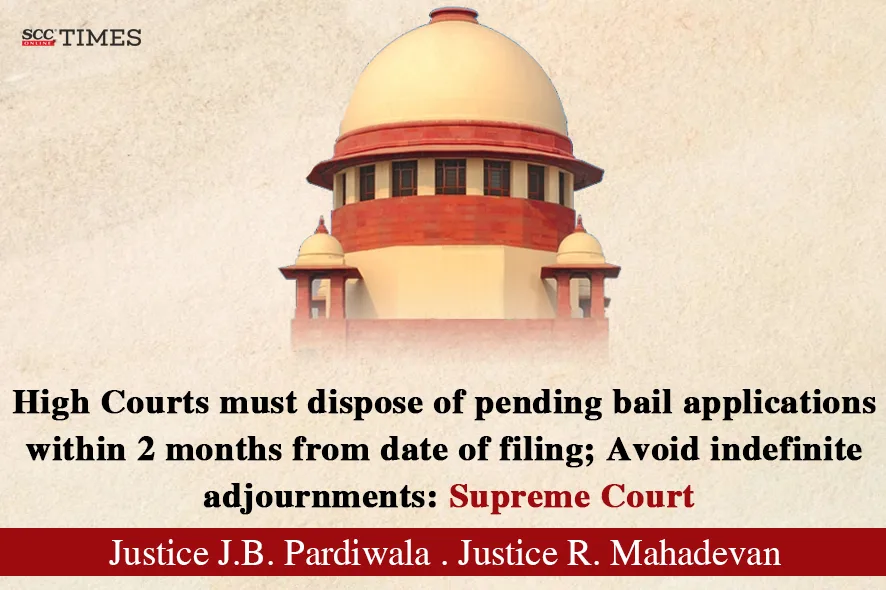Supreme Court: While considering the instant appeal against common judgment of Bombay High Court dismissing appellants’ bail applications, the Division Bench of J.B. Pardiwala and R. Mahadevan*, JJ., opined that applications concerning personal liberty cannot be kept pending for years while the applicants remain under a cloud of uncertainty. “The consistent line of authority of this Court makes it abundantly clear that bail and anticipatory applications must be decided expeditiously on their own merits, without relegating the parties to a state of indefinite pendency”.
The Court explained that prolonged delay in disposal not only frustrates the object of CrPC, but also amounts to a denial of justice, contrary to the constitutional ethos reflected in Articles 14 and 21. Therefore, the Court issued the following directions:
-
High Courts shall ensure that applications for bail and anticipatory bail pending before them or before the subordinate courts under their jurisdiction are disposed of expeditiously, preferably within a period of two months from the date of filing, except in cases where delay is attributable to the parties themselves.
-
High Courts shall issue necessary administrative directions to subordinate courts to prioritise matters involving personal liberty and to avoid indefinite adjournments.
-
Investigating agencies are expected to conclude investigations in long pending cases with promptitude so that neither the complainant nor the accused suffers prejudice on account of undue delay.
-
Being the highest constitutional fora in the States, High Courts must devise suitable mechanisms and procedures to avoid accumulation of pending bail/ anticipatory bail applications and ensure that the liberty of citizens is not left in abeyance. In particular, bail and anticipatory bail applications shall not be kept pending for long durations without passing orders either way, as such pendency directly impinges upon the fundamental right to liberty.
Background:
In 2019, an FIR was registered against M and others for offences punishable under Sections 420, 463, 464, 465, 467, 468, 471 and 474 read with Section 34 of the Penal Code, 1860 (IPC) in connection with a property dispute. The appellants, in that point of time, were serving as Circle Officer and Talathi respectively in the Revenue Department of the State of Maharashtra and were not initially named in the FIR. They were later arraigned as Accused Nos. 5 and 6 on allegations that, in their official capacity, they had certified the said mutation entries on the basis of forged documents, thereby facilitating the illegal transfer of ownership of the immovable property.
The appellants preferred anticipatory bail applications, which was subsequently rejected by the Sessions Court. The appellants approached the High Court, but via the impugned judgment dated 04-07-2025, the High Court too rejected the anticipatory bail applications but granted interim protection for a period of four week, which expired on 01-08-2025. Thereafter, the appellants have preferred the present appeals before the Court.
Court’s Assessment:
Perusing the facts of the case, the Court stated that there had been a long delay in the initiation of proceedings, the gravity of the allegations, the alleged abuse of official position, and the prima facie findings of the High Court that custodial interrogation is necessary, cannot be diluted merely on the ground of delay.
The Court stated that even in a case based largely on documentary evidence, custodial interrogation may be essential to trace the chain of transactions, ascertain complicity, and prevent further suppression or tampering of records. The Court pointed out that the appellants, despite enjoying interim protection for nearly six years, did not extend due cooperation to the investigation. In these circumstances, the Court saw no reason to interfere with the judgement under challenge.
However, the Court took note of a significant issue that arose in the case, that being the inordinate delay in the disposal of the appellants’ applications for anticipatory bail by the High Court. The record disclosed that the applications remained pending for several years without any final adjudication, although interim protection was extended to the appellants from time to time, including even after the dismissal of the applications, until 01-08-2025.
The Court pointed out that it had consistently underscored that applications affecting personal liberty — particularly bail and anticipatory bail — ought not to be kept pending indefinitely. The grant or refusal of bail, anticipatory or otherwise, is ordinarily a straightforward exercise, turning on the facts of each case. Therefore, there is no justification for deferring decision-making. In matters concerning liberty, bail courts must be sensitive and ensure that constitutional ethos is upheld. While docket explosion remains a chronic challenge, cases involving personal liberty deserve precedence.
Relying on several precedents highlighting the Court’s emphasis on prioritising bail applications, the Court reiterated that bail applications cannot be put on a state of indefinite pendency thereby frustrating the object of CrPC and “allowing a sword of Damocles to hang over the applicant’s head”.
Therefore, the Court deemed it fit to issue the afore-stated directions concerning the expeditious disposal of bail and anticipatory bail applications. The Court however, dismissed the appellants’ appeals.
[Anna Waman Bhalerao v. State of Maharashtra, 2025 SCC OnLine SC 1974, decided on 12-9-2025]
*Judgment by Justice R. Mahadevan
Advocates who appeared in this case:
For Appellant(s): Mr. Ardhendhumauli Kumar Prasad, Sr. Adv. Mr. Shantanu Phanse, Adv. Ms. Preet Phanse, Adv. Ms. Vidhi Pankaj Thaker, Adv. Mr. Prastut Mahesh Dalvi, AOR



